

Proving PR & SEO Seriously Lift Advertising ROI. Unless you’ve got a time machine, it’s not always realistic to achieve a sustainable CPA (cost per action) by way of paid cost-per-click online marketing channels alone.
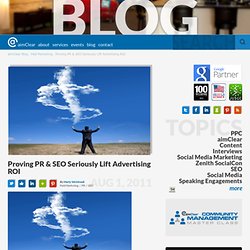
This post offers a pragmatic multi-channel scenario to prove the significant financial benefits of SEO, social media, and public relations for CPA-pumping traffic and conversion. In the early days, target CPAs were usually attainable solely by paid online advertising. That said, for years we’ve advised clients to establish their customer base while advertising costs in new channels remained low. For instance, in 1999 and 2000 the rising cost of Overture PPC blew our doors off as the bargains waned. Early adopters who had already built their brand with inexpensive/high yield pay per click were already hooked up.
The phenomena of continual cost increases, commensurate to new advertising channels’ growth, proved especially radical in 2003 and 2004 as Google’s AdWords search PPC program steadily increased in cost. SEO Money Back Guarantee - Factors that Determine Link Value. PageRank of the Host Page: PageRank (PR) does not play as big a role today, as it used to a few years ago.
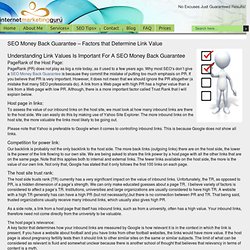
Mobile Now 12 Percent Of All Paid Search Impressions. Earlier today Performics reported another mobile search milestone: “mobile paid search traffic is now 12% of all paid search impressions (mobile + desktop), while mobile clicks are about to cross the 12% threshold.”
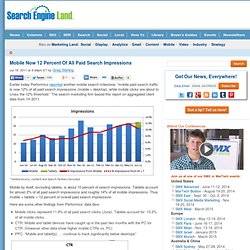
The search-marketing firm based this report on aggregated client data from 1H 2011. Mobile by itself, excluding tablets, is about 10 percent of search impressions. It’s Not “He Said, She Said” Over Google Rankings & Facebook Shares. On Tuesday morning, SEOmoz’s Rand Fishkin presented evidence at our SMX Advanced conference that there’s a high correlation between Facebook Shares and ranking well on search engines.
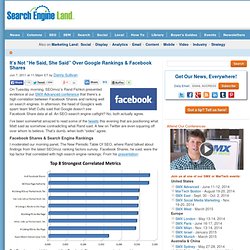
In afternoon, the head of Google’s web spam team Matt Cutts said that Google doesn’t see Facebook Share data at all. An SEO-search engine catfight? No, both actually agree. Are QR Codes Good For Local Marketing? A Contrarian View. Quite a few marketers have raved about QR codes as the best thing since sliced bread.
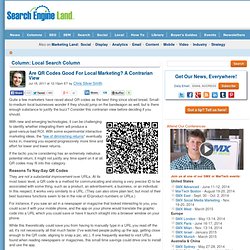
Small-to-medium local businesses wonder if they should jump on the bandwagon as well, but is there enough substance to justify the buzz? Consider this contrarian view before deciding if you should. With new and emerging technologies, it can be challenging to identify whether integrating them will produce a good-versus-bad ROI. With some experimental interactive marketing ideas, the “law of diminishing returns“ eventually kicks in, meaning you expend progressively more time and effort for lower and lower returns. Searchengineland.com. Welcome, Greg Finn & Gary Price To Search Engine Land! Today, Search Engine Land welcomes two new contributing editors: Gary Price and Greg Finn, who will focus on search and social media for the site, respectively.

I’ve known Gary for years, and it’s a pleasure to be working with him again. There is nothing related to search engines or research tools that Gary doesn’t know. Attend any research or library conference, and Gary’s surrounded like the rock star he is. Gary will be focusing on new search tools, search features and how searchers can get more out of the search engines they use. Outside of Search Engine Land, Gary’s co-founder and co-editor of INFOdocket and FullTextReports.com, which contain news and new resources of interest to information professionals, journalists, educators, and others. Search Engine Ranking Factors. IAB: 2010 Online Advertising Worth $26 Billion, Search 46 Percent. The IAB released its full year 2010 online advertising report this morning.
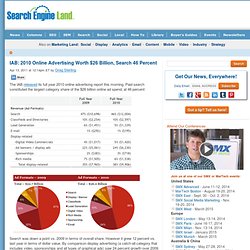
Paid search constituted the largest category share of the $26 billion online ad spend, at 46 percent: Search was down a point vs. 2009 in terms of overall share. However it grew 12 percent vs. last year in terms of dollar value. December 14, 2010.
Spectrum Dashboard - Reboot.FCC.gov. Consumer Attitudes Towards Recommendations of Local Business. Bightlocal has released their findings from their Local Consumer Review Survey 2010, Part 3.
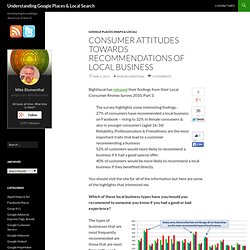
The survey highlights some interesting findings - 27% of consumers have recommended a local business on Facebook – rising to 32% in female consumers & also in younger consumers (aged 16-34) Reliability, Professionalism & Friendliness are the most important traits that lead to a customer recommending a business 52% of customers would more likely to recommend a business if it had a good special offer. 40% of customers would be more likely to recommend a local business if they benefited directly. SEMPO: Google Dominates But Social Now Widely Used For PPC. Yesterday SEMPO and Econsultancy released the 2011 “State of Search Marketing Report” featuring attitudes and spending behaviors of 920 survey respondents (agencies, advertisers) from more than 60 countries.
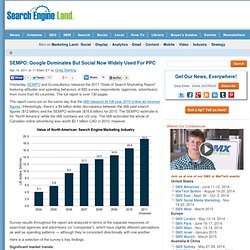
The full report is over 130 pages. The report came out on the same day that the IAB released its full-year 2010 online ad revenue figures. Interestingly, there’s a $4 billion dollar discrepancy between the IAB paid-search figures ($12 billion) and the SEMPO estimate ($16.6 billion) for 2010. The SEMPO estimate is for “North America” while the IAB numbers are US only. The IAB estimated the whole of Canadian online advertising was worth $2.1 billion CAD in 2010, however.
Internet World 2011 - How can Marketers better understand Online Customers for more in 2011? Local SEO Predictions 2009. Report: Google Desktop vs Google Smart Phone Search Results. Bryson Meunier posted a study showing that search results on a desktop different from search results on a smart phone by about 86%.
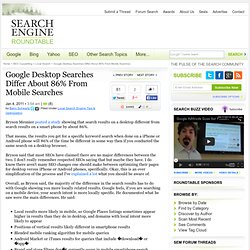
That means, the results you get for a specific keyword search when done on a iPhone or Android phone will 86% of the time be different in some way then if you conducted the same search on a desktop browser. Bryson said that most SEOs have claimed there are no major differences between the two. I don't really remember respected SEOs saying that but maybe they have. I do know there aren't many SEO changes one should make between optimizing their pages for desktop versus iPhone or Android phones, specifically. Okay, this is an over simplification of the process and I've explained a lot what you should be aware of. Overall, as Bryson said, the majority of the difference in the search results has to do with Google showing you more locally related results. Forum discussion at Sphinn. Survey: Gen Y Accessing Web On Mobile More Than PC.
Many marketers continue to think that the mobile internet is still too small to be worth attention. Indeed, on a global basis the mobile web represents less than 5 percent of all internet traffic, according to StatCounter. (See Royal Pingdom on usage in specific regions.) Two months ago Forrester Research issued a report dismissing location-based services as too marginal to be worth attention. Pew seemed to confirm that assessment with similar findings. The mobile skeptics and laggards appear to be validated by the numbers, right? New: A Limited Beta Version of the New Yahoo Local/Hyperlocal Now Available.
Should You Bid On A Keyword If You Rank Organically For That Term? Over the past several years, I have done numerous case studies with companies looking at the differences in their paid traffic when they also rank organically for a term. In this column, I’m going to share some of that data and walk you through some simple calculations you can do to see if you should buy that keyword. U.S. Online Ad Spend Slows. NEW YORK eMarketer has revised its Internet ad spending projections, estimating that advertisers will spend $24.5 billion online this year in the U.S. That estimate is slightly lower than the one eMarketer put out in November 2008, which said that U.S. online advertising spending would reach $25.7 billion in 2009.
It is important to note that the lowered estimate still represents an increase of 4.5 percent over 2008 spending. Marketers spend more on Internet ads, while they spend less on advertising placed in other media, such as newspapers, radio and magazines. These spending shifts predate the recession, but the current economic forces both reinforce the new advertising models and make them more permanent. Marketers can more readily measure the results of Internet advertising than with most traditional media, both during campaigns and after they are completed. In recent weeks, ad forecasts across almost all media have turned decidedly negative: 3 Important Ecommerce Trends To Watch. The web is shifting rapidly, again. Search has seen accelerated growth over the last two years, at a quicker clip than any time over the last ten. This has been fueled primarily by innovations at Google. However, Bing is also pushing innovation rapidly and was cited by Google CEO Eric Schmidt as, their “biggest problem” and competitor.
Schmidt conceded to the Wall Street Journal that, “Bing is a well run, highly competitive search engine.” Interesante / ¿Que es un Community Manager? ¿Necesitas uno en tu empresa? (Parte 1)